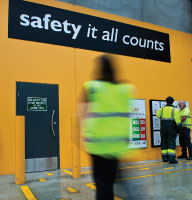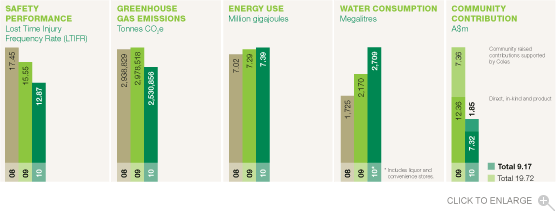About our business
We are one of Australia’s leading retail businesses with brands including Coles and BI-LO supermarkets, 1st Choice Liquor Superstores, Liquorland, Vintage Cellars and Coles Express.
We employ approximately 106,000 team members and operate more than 2,200 outlets. More than 17 million transactions take place across all our brands each week.
Over the last year, we have opened and refurbished 35 supermarkets with new store formats. We continued to invest in store standards, customer service and our supply chain to provide a platform for future growth.
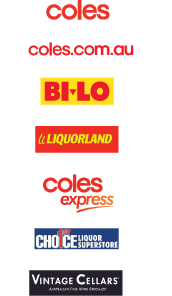
Year in review
We have completed the second year of our turnaround strategy and progressed a range of initiatives to improve the shopping experience of our customers. We invested $22 million to place over 120,000 new trolleys in our stores. Two of our new styles of trolleys have been designed for convenience shoppers and parents with small children.
New supermarkets opened and others were refurbished with our latest store design, which has an open and welcoming entry for customers into a market-style fresh produce area. Fixtures are lower, so customers can move around the fresh food areas with ease and where possible the long aisles are split to improve customer navigation.
2010/2011 Priorities/Outcomes
| 2010 Priorities | Outcomes | Status | 2011 Priorities |
|---|---|---|---|
| Training and development of our team members. |
890,047 hours of employee training – up 18.7 per cent. Over 450 participants in our Retail Leaders and Graduate Programs received internal appointments at Coles. |
|
|
| Customer trust in our product range, value and quality. |
State and territory-based grocery pricing introduced to provide consistent pricing. Daily Intake (DI) nutritional labelling now featured on 776 Coles brand products. Expanded our Coles brand Fairtrade tea and coffee range. Launched RSPCA accredited Coles Finest free range pork. |
||
| Water saving and energy efficiency of our stores. |
Night blinds for food refrigeration cases introduced for 162 supermarkets. Energy saving lighting controls installed at more than 100 supermarkets. Commenced installing low energy lighting at our Smeaton Grange distribution centre, NSW. Tote washers using recycled water were installed at two national distribution centres to clean plastic storage containers. |
||
| Workplace safety for our team members. |
LTIFR reduced last year from 15.55 to 12.87. Manual handling and essential safety training programs launched across the business. |
||
| Support the local communities in which we operate. |
Our total community investment for the year was more than $9 million. 92 shopping devices provided to assist Coles customers with low vision. Raised more than $1.34 million for the Cancer Council Helpline. Awarded 442 garden grants to schools – over 808 since the program launched in 2008. |
KEY
![]() Achieved
Achieved
![]() Partially achieved
Partially achieved
![]() Not achieved
Not achieved
Sustainability highlights
Key sustainability highlights for Coles during the year included the following:
Consistent pricing
- Coles moved to state and territory-based grocery pricing in February 2010. Coles now applies its lowest prices to more than 8,000 grocery products. The remaining grocery products are matched to our lowest prices in each state and territory with the exception of a small number of remote locations where we face higher freight costs.
Daily Intake nutritional labelling
- We continued the introduction of DI labelling for packaged Coles brand products during the year. As at 30 June, 776 Coles products have this labelling, which was developed to help consumers easily understand the nutritional content of a serve of a particular product and how it contributes to their daily diet.
Packaging
- In March 2010, we began reviewing packaging for Coles branded products. The review will measure our packaging against the Sustainable Packaging Guidelines, which will be part of the new Australian Packaging Covenant.
- A new bottling process introduced by our Victorian-based spring water supplier, Mountain H2O, during the year has substantially reduced the amount of plastic, fuel and water used to produce Coles brand Spring Water. Coles Spring Water is now up to 40 per cent lighter across three product sizes which, when based on the annual volume of water bottled, will result in 187,000 kilograms of plastic saved.
Shopping bag recycling
- In June 2010, we launched a two-week bag drive to provide customers with a convenient and environmentally responsible way to dispose of their reusable bags made of polypropylene. As a result of our bag drive, over 37,000 bags were saved from landfill and will be turned into outdoor furniture and donated to schools. In September 2009, over 220,000 single use plastic bags were also collected and recycled as part of our Plastic Bag Challenge with Landcare.
Fairtrade
- During Fairtrade Fortnight in May 2010, we announced the launch of three new Coles branded Fairtrade and Organic tea lines and five Fairtrade coffee lines which adds to our existing award winning Coles Finest Ethiopian Fairtrade coffee blend. Through Fairtrade we support tea and coffee growers in countries such as Tanzania, India, Ethiopia, Indonesia, Papua New Guinea and Peru.
Listening to our customers
- As part of our aim to put our customers at the heart of our business, in September 2009 we launched our ‘Listening to 1 million customers’ program, which now operates in approximately 260 supermarkets. The online survey allows customers to provide feedback on their most recent shopping experience.
Leadership Award
- In October 2009, we were recognised by Foodbank Australia and awarded the annual Leadership Award for our many years of making food donations for people in need. We were the first Foodbank donor to donate over a million kilograms of food in one year.
Performance charts
People
As at 30 June 2010, Coles employed 106,030 team members of which 91,693 work in supermarkets, 8,574 in liquor stores and hotels and 5,763 work in fuel and convenience outlets. During the year, hours worked by part-time team members increased to provide greater permanency to our part-time workforce. This has resulted in a decrease in the number of casual team members employed and, therefore, our total workforce.
Awards and recognition
Our team members and stores were recognised for their customer service excellence at industry awards during this year.
Coles Express represented Australia at Shell’s Global ‘People Make the Difference Real’ annual awards in Malaysia. Site Manager, Rupi Singh and the team at Coles Express Laverton (Vic) took out the award for the Shell ‘Smiling Star Retailer of the Year’ for Australia.
Our hotel business (Spirit Hotels Queensland) was recognised as part of the annual Queensland Hotels Association Awards for Excellence. Our Mango Hill Tavern was awarded Best New Hotel/Tavern and Spirit Hotels Queensland won the Responsible Serving – Gaming award.
The Liquor Stores Association of NSW hosted the Retail Liquor Industry Awards for Excellence in November 2009. In the Retailer Category Winners division, Liquorland Bathurst store manager, Jarrod Ronan, was voted Liquor Store Manager of the Year.
Training
This year we continued to grow our Retail Leaders Program, which was launched in 2008, as the pathway for internal talent to progress to leadership roles in supermarkets. During the year, there were 343 participants in this program.
Our 12-month Retail Operations Graduate Program is one of the major avenues for career development at Coles and this year we saw our largest graduate intake to date with 104 graduates participating. More than 450 team members have achieved internal appointments following their participation in the Retail Leaders Program and our Graduate Program.
Coles Express launched the Getting Started Program for new team members. Approximately 1,400 team members have completed this program, covering all aspects of the business including compliance, technical and customer service.
Coles Liquor continued to focus on product knowledge and this has resulted in an increase in the number of Liquor Product Training Framework completions to 49,000. In addition, the Coles Liquor Customer Service Video Training and Assessment Program was launched in April 2010 and has been delivered to 3,500 team members.
Team member engagement
In July 2009, we introduced ‘We are listening’ surveys for team members which provide us with regular updates on the level of team member engagement. As at June 2010, approximately 65,000 surveys have been completed from across supermarkets, liquor, Coles Express and our Store Support Centre.
Safety
Our LTIFR fell to 12.87 from 15.55 and our AIFR was higher at 97.97 compared with 95.28 at the same time last year.
During the year, the number of workers’ compensation claims decreased to 5,474 from 5,482 last year.
We delivered a new competency-based manual handling training program for liquor team members. Six health and safety ‘non negotiable’ standards were launched to promote safe working environments and behaviours designed to reduce the risk of injury for team members, customers and visitors.
To better equip future supermarket store managers and department managers with essential safety knowledge, we incorporated a new training module into our Retail Leaders Program.
A manual handling program was also re-launched for Coles Express team members during the year, which incorporated a DVD on specific manual handling tasks and safe work practices. On 8 June 2010, a National Safety Day was held where team members from Coles Express and Shell participated in a manual handling coaching activity and served customers on the forecourt while discussing the importance of safety at our sites.
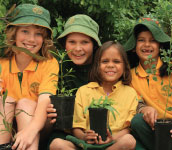
Students at Moffatdale State School, Qld received a Coles Junior Landcare School Garden Grant
Photograph by Jessie Hodgson, Nature and Nurture Photographics
Environment
Water
This year, we were able to map our water usage across more than 2,200 supermarkets, liquor stores, hotels, Coles Express sites and our Store Support Centre in Vic. Our total water usage was 2.71 gigalitres.
The estimated water consumed by our supermarkets decreased to 1.6 gigalitres. Many of our sites do not have water meters, so our data is extrapolated from actual water bills across 137 supermarket sites nationally.
Similarly, we extrapolated a sample of sites to find our 862 liquor stores and hotels consumed 613 megalitres. Our 619 Coles Express sites, including those with car washing, consumed 457 megalitres.
At our Store Support Centre in Tooronga, Vic, we have reduced water consumption to less than 34 megalitres. Initiatives include the installation of two 55,000 litre water tanks to help establish our new low maintenance garden.
At our distribution centres at Eastern Creek, NSW, and Somerton, Vic, we installed tote washers which automate washing and recycle water used for cleaning plastic storage containers.
Waste
This year we recycled 131,242 tonnes of cardboard, paper, plastic, metal and organics, and sent 90,961 tonnes of waste to landfill which was down 26 per cent on last year.
More than 59 per cent of our waste was recycled. Organic food waste is currently collected from approximately 130 supermarkets to produce compost, fertiliser and gas for electricity generation. We have plans to expand this collection to WA in the coming year.
In November 2009, we trialled the collection and recycling of donut oil and chicken fat waste at our Victoria Gardens supermarket in Melbourne. After a successful trial, the service was rolled out at 125 supermarkets in NSW, Qld and ACT where chicken fat can be separated.
During the year, waste audits conducted at our liquor sites found that over 90 per cent of our waste was recyclable. In trials at three liquor stores, we reduced landfill bin capacity and increased recycling collections. Over a three month period, recycling at these sites increased by 60 per cent and waste sent to landfill fell by 70 per cent. This approach has now been implemented for all Coles’ liquor stores.
Contamination/remediation
In our last report, we reported on a soil and groundwater contamination issue at a Coles Express site in Mooroopna, Vic, and the adjoining property. The site, which has been monitored and tested over the last two years, shows a reduction in the level of hydrocarbons which are attenuating naturally.
Environment protection and Coles Express
Both the ACT and Tasmania introduced legislation during the year relating specifically to the management of underground petroleum storage systems. The legislation contains specific responsibilities for operators such as Coles Express and our alliance partner, Shell Australia, as well as property owners. Coles Express and Shell are currently working closely with Tasmania and ACT to prepare Environmental Protection Plans and other documentation to ensure full compliance by the relevant due dates.
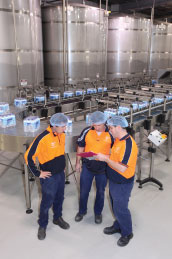
Coles Spring Water bottles are now up to 40 per cent lighter due to a new bottling process. This process received the bronze award in the sustainability category at the 2010 Australian Packaging Awards.
Carbon and energy
Greenhouse gas emissions
Our total greenhouse gas emissions were estimated to be 2,530,856 tonnes of CO2e, down 15 per cent on last year, and this equates to 84.4 tonnes of CO2e per million dollars of revenue, down 18 per cent on last year.
Energy use
Our main uses of energy are: electricity for refrigeration, lighting and cooling in our stores, distribution centres and support centres and natural gas and LPG for space and hot water heating. Total energy consumption was estimated to be 7.39 million gigajoules, up one per cent on last year. Our total energy consumption per million dollars of revenue was estimated to be 246 gigajoules, down three per cent on last year. This energy use is made up of 93 per cent electricity and seven per cent fuel.
Energy efficiency initiatives
During the year, we undertook a range of initiatives to reduce our energy use and emissions.
We installed night blinds at 162 supermarkets to reduce the night-time energy use of our refrigeration systems. The balance of stores will have these blinds by next year. We also launched a program to better manage lighting for our supermarkets by automatically controlling lighting outside of trading periods. This initiative has been completed for over 100 stores and a further 150 will be completed in the coming year.
We continued our program of installing anti-condensate heater controls to glass door freezers in suitable older stores which reduce the energy use of heaters in the glass doors. We completed 100 stores this year, bringing the total completed so far to 235 stores.
Coles commenced a partnership with City Facility Management Australia on 1 September 2009 for servicing refrigeration equipment at all supermarkets. Through this partnership we have been able to more accurately measure the refrigerant used by our stores, rather than reporting the default leakage rate as provided under NGER.
Governance
Ethical sourcing
Over the past year, we redeveloped our Ethical Sourcing Policy and asked suppliers of Coles brand products to self-assess their level of compliance with our policy. A further 398 suppliers, which operate in non-OECD member countries, are in the process of being reviewed with a view to being certified to the Coles Ethical Sourcing Code or a mutually recognised Code within three years. Audits and self assessments received from suppliers are being independently reviewed by our social auditing firm, SGS Australia Pty Ltd.
Salt reduction
Coles participates in the Federal Government’s Food Health Dialogue which has set salt (or sodium) reduction plans for product categories. Targets have been set for breakfast cereals and breads. The majority of Coles brand breakfast cereals are now formulated below the Food Health Dialogue target of 400 milligrams of sodium per 100 grams serve and we have already achieved a 19 per cent reduction in salt levels across our breakfast cereals range.
Bisphenol A (BPA) and baby bottles
In June 2010, we voluntarily announced a move to a totally BPA-free range of baby bottles to meet community concerns about the use of certain chemicals in products that are regularly heated as part of the sterilisation process.
Palm oil
Since 2009, all newly labelled Coles branded products have declared the source of all vegetable oils, including palm oil and palm kernel oil. In September 2010, Coles joined the Roundtable on Sustainable Palm Oil and will progressively convert to sustainably sourced palm oil for Coles products by 2015.
Animal welfare
In July 2010, we announced our commitment to move to sow stall free pork by the end of 2014 and launched Coles Finest Free Range Pork in 60 stores in ACT, NSW and Vic. Our free range pork range has been developed in conjunction with the RSPCA and ensures that pigs are able to roam and socialise while accessing indoor areas as needed. We will expand this offer as additional supply becomes available.
Trolleys
During this year, a trial of a Carttronics wheel lock perimeter system at our Mount Annan and Chatswood (NSW) supermarkets proved successful and the system is now operating at 13 stores. At Coles Surry Hills, NSW, the system has reduced the average number of trolley collection runs required each week from 42 to seven. We expect to introduce the system more broadly in the coming year.
Biofuels
We have been working with our Alliance Partner, Shell Australia, to meet government biofuel targets through the distribution of Shell Unleaded E10 (unleaded petrol with 10 per cent ethanol) in NSW. As at June 2010, there are 308 Coles Express sites in NSW, ACT, Qld and Vic currently offering E10.
From 1 January 2010, the NSW Government mandate for ethanol-blended fuels increased from two per cent to four per cent of total petrol sold in that state. In order to meet the mandate we have converted 88 sites to Shell Unleaded formulated with 10 per cent ethanol (re-branded from Shell Unleaded E10) as the main grade fuel and removed regular Shell Unleaded fuel.
Tobacco
During the year, new laws commenced in NSW and the ACT that banned the retail display of tobacco products and required other changes to in-store ticketing, signage and notification/licensing arrangements. We have implemented arrangements to ensure compliance with the new laws.
Further tobacco display bans are due to commence in other states and territories over the coming two years, and began with WA in September 2010.
Liquor and responsible gaming
As part of ensuring we provide a safe hotel environment for our customers, we improved car park signage at all of our hotel venues during the year which reminds customers not to leave children in our car parks unattended. We also introduced a process for hourly checks of car parks by team members at all our hotels, which goes beyond our legal obligations.
For our hotels with gaming rooms, we screened off 35 gaming rooms from the general hotel area to ensure families with young children can enjoy our facilities without accidentally entering or observing the gaming area.
Non-compliance/prosecutions
In March 2010, we were fined $90,000 for two charges relating to a WorkCover incident which occurred at BI-LO Vincentia in NSW in 2006. A third charge relating to the incident was dismissed by the court.
To enhance safety and minimise future risks at the store, we have implemented engineering controls around the back dock area and installed a new scissor lift.
Community
Our community investment is reviewed by LBG and this year we raised and contributed more than $9 million. Of this total, approximately $3.7 million represents our support for programs we sponsor with the Australian Red Cross, Cancer Council, Guide Dogs and Landcare.
We raised $1.34 million from customers for Cancer Council through our support for Daffodil Day in August 2009, and donated $120,000 to the Sydney Children’s Hospital where our funds support the treatment of children with cancer and blood disorders.
During the year, we launched the Coles ID Mate, a talking portable barcode scanning device which assists low vision customers to shop more easily in our stores. Ninety-two devices were provided to customers at a cost of over $100,000.
For additional information about our community programs, please visit our online report at www.coles.com.au
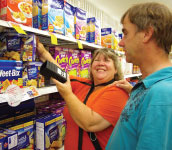
During the year, we launched the Coles ID Mate, a talking portable barcode scanning device which assists low vision customers to shop more easily in our stores.
Economic investment
Our total operating revenue for the year was $30 billion and our earnings before interest and tax was $962 million – up 15.8 per cent.
As at 30 June 2010, we have 2,223 outlets which includes 742 supermarkets, 766 liquor stores, 96 hotels and 619 Coles Express sites. During the year, over $700 million was invested in our business. In the coming year, we will accelerate our store renewal program with more than 100 stores due to be opened or renewed.

